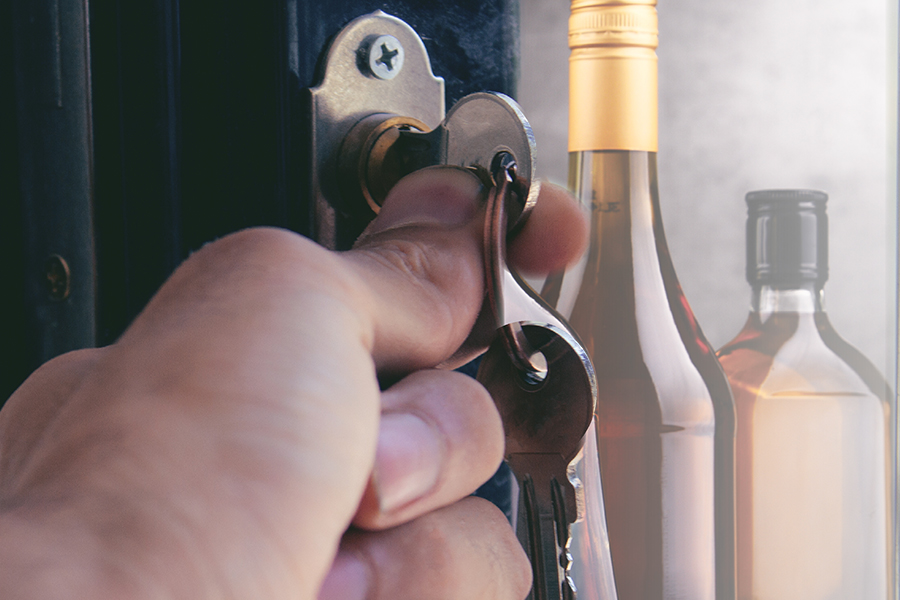Alcohol in the House: 3 Tips for Keeping it Away from Kids

If you’re like most parents, child safety has been a major concern since the moment your child was born. You probably shopped for the most secure car seat, put plug covers on electrical outlets, and installed baby gates in front of stairs.
As your child ages, some worries fade, and others appear. One of the latter is how to keep your child from accidentally or purposefully consuming any alcohol you choose to keep in the house. Here are some factors to consider.
Keeping alcohol in the house.
If you’re over the age of 21 and want to enjoy an alcoholic beverage at home, it’s also your responsibility to be mindful of potential dangers alcohol can hold for younger children and teens:
- Accidental Ingestion: Young children may decide to taste the brightly colored liquids in the pretty bottles, especially ones that smell like fruit or candy. Or they may mistake cans of alcohol for sodas or other beverages they’re allowed to have. Ingesting even a small amount of these adult beverages could cause alcohol poisoning in kids.
- Experimentation: Tweens are naturally curious about the world around them and may want to see what alcohol tastes like and how it makes them feel. If getting alcohol at home is easy, they may be more tempted to experiment with underage drinking.
- Sneaking Alcohol: Teenagers often face peer pressure to drink alcohol. Because they can’t buy it legally, they may resort to sneaking it out of the house to share with friends.
Where might kids access alcohol in the house?
While some adults know where every drop of alcohol is kept in their home, you’d be surprised how often it hides in plain sight. For instance, you may not think about the liquor in the decorative canister on the mantelpiece or the leftover case of beer you threw into the pantry after tailgating, but your teen has probably thought about them. And while you may forget the stray hard seltzer or canned cocktail sitting in the back of the fridge after a barbecue, it’s easy for your child to stumble across them while looking for a juice box.
Should I consider locking up alcohol?
Given the potential risks, locking up alcohol is a good way to keep your children from accessing it at home. Not only will you prevent accidental ingestion and reduce the temptation for teens to try alcohol, but you’ll also be setting clear boundaries and sending the message that alcohol is for adults only. These methods will keep your alcohol secure:
- Store it in a high cabinet: When your kids are little, you may only need to keep it out of their sight and reach.
- Lock it up: As your children get older, you may need to install a childproof lock on your cabinet or invest in a liquor cabinet or safe that can be securely locked. You can even request free locks from North Carolina’s Talk It Up. Lock It Up! program.
- Monitor it: Keep track of the alcohol you have in your house. For instance, don’t put any more beer or wine in the fridge than you’ll drink in one sitting and pay attention to how much liquor is in each bottle. If you decide to keep an eye on your liquor levels rather than put the spirits under lock and key, it’s advisable to take the occasional sip just to make sure your teen isn’t replacing the alcohol with water to evade detection.
How can I stop my child from sneaking alcohol?
Locking up alcohol is a solid first step, but you also need to develop a comprehensive approach to preventing underage drinking. Consider these strategies:
Talk with them: From an early age, have honest conversations with children about alcohol and the dangers of underage drinking. Make sure they understand that their brains are still developing until age 25 and that alcohol can negatively impact that important developmental period.
- Establish clear expectations: Make sure your child understands family rules about underage drinking and the consequences for breaking them. Don’t bend the rules to allow your child to have alcohol with you, or they may think it’s acceptable to drink at other times.
- Be a role model: Children learn a lot from watching their parents. If you drink alcohol, do so responsibly and don’t drive after drinking.
- Stay aware: Pay attention to what your child is doing at gatherings where alcohol is present, especially if they have friends there.
- Watch for changes in behavior: Look for any signs that your tween or teen is experimenting with alcohol. You might see a sudden decline in grades, a change of friend groups, or erratic mood swings.
- Maintain a supportive environment: When your child feels safe talking with you about challenges or concerns, they’re less likely to hide their actions from you. Plus, you’re more likely to spot any of the causes of teenage drinking before your child develops an issue.
Put safety first!
If your kids are determined to experiment with alcohol, they’ll probably find a way, even if you never keep alcohol in your house. However, by taking proactive steps, you can help prevent underage drinking and keep your children safe.
Start the Conversation with your child today to make sure they understand the risks of underage drinking.



